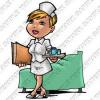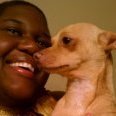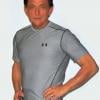Search the Community
Showing results for 'weight gain'.
Found 17,501 results
-
Hi people! My name is Bonnie and I'm 20 years young. This all started for me when my mother was having a conversation with her twin sister and I thought she was joking when she said she wanted to get banded. So I said, "If you're doing it, then so am I." I have struggled with my weight since a very early age, between kindergarten and first grade. My diet and exercise habits were always poor. Since my father was in the Navy and hardly ever at home, my mother went into a severe depression and her overeating is triggered by stress. Thus I learned to eat like her, behave like her. I do not blame my mother, per se. That simply isn't fair, albeit she was responsible for the nutrient poor food she gave me to eat, for not encouraging exercise and for setting the example of sit-and-watch-TV-and-mope-about. She has admitted this many times and she says she's sorry, but what's done is done. Well, it's been sixteen years and now I've finally decided to get serious about it- not that I haven't tried and failed many times before- and I feel that this surgery is the way to go. I have read a lot of success stories and my boyfriend says his ex had a friend who got the procedure and obtained amazing results from it. I hope I do well in this. I'm determined to lose this weight that has burdened me for too long and I know that I will do everything in my power to not let anything stand in my way. I also know that there will be many things to deter me from progressing, but I want this so badly that I know I will be able to push through it. I'm glad to have found this forum, it will certainly help on support! Good luck to you all! Bonnie
-
I am new to the forum and haven't done this type of thing before so I hope I am doing it right! Not banded yet but finishing up preop requirements for insurance and should be scheduled end of April. I would love more info on life after banding, the good and the bad. I have read alot about people fighting hunger in the first couple months and even gaining weight! Is this going to be enough? I am not considering bypass because it is to radical for me. New gastric sleeve procedure sounds like the best way to go but my ins won't cover. I would love to hear from some of you who are postop and have any helpful hints! Good luck to everyone out there fighting this battle to improve health and happiness!
-
How do you get one of the weight loss tickers?
-
Thanks for your support I was released from the hospital today after a month in the hospital. I had a mesh stent in my esophagus for a week, it was the most painful experience I have ever gone through, kept vomiting non stop for three days straight, the next 4 days in constant pain like something just wanted to come out of my chest. Had to stay upright that whole week was impossible for me to lie down so didn't sleep much at all through the week. But it's all over and I can not be more happier. I am on Puree foods for the next three weeks but having eaten nothing since the 7th of July, this is like a feast. As most people say there is light at the end of the tunnel, now on to start my new weight loss journey and to live a happier and healthier life.
-
Hi folks! So I've been posting for a little while, but I kept forgetting to come over there and actually introduce myself. (How rude! lol) Now I'm doing some heavy-duty law school paper procrastination, which makes this the perfect time to post. I'm Rachel. I'm 30 years old. I live in the Washington, DC, area right now, though I've lived in a lot of other places. I'm originally from the Deep (Fried) South and come from a family of people with weight issues. I had my surgery on 12/28/11 with Dr. Kelly in TJ. I was really nervous about it at first, but the process went fairly smoothly. The company that handled the logistics, nutritionist, etc. wasn't that great (no big problems--just a lot of little ones), but Dr. Kelly was AWESOME. At the end of the day, that's all that mattered. I'm just starting to get over my "leak anxiety," which had me pretty freaked out for a couple of weeks, especially for a few days after an episode of overeating hummus. I was really uncomfortable, and I started having some weird sensations--of course my anxious brain dreamed up the worst scenarios, fueled by the worst things I had read about on the boards. Besides time, the thing that has been helping me get over the anxiety was buying a good digital thermometer and checking my temperature twice a day--that has helped convince me that I don't have a bad infection and am therefore not currently dying of leak-induced sepsis. (Lesson learned: Don't belittle or deny the anxiety--acknowledge it and figure out a way to address its needs while getting on with life.) I'm also starting to feel a lot stronger now that I can eat more. It's just been a few days ago that the swelling in my stomach went down substantially. Now instead of just a couple of teaspoons of mushy food, I can handle 1/4 to 1/2 cup of mushy and some solid foods. Life's a lot better when you don't feel like you could pass out at any moment! I don't yet feel up to exercising--I started back to work and school a week after surgery, and I've felt really wiped out most of the time since then--but I'm planning to start walking on a treadmill this weekend. So that's my story up to this point. Best of luck to all of you on your journeys!
-


Not by surgery alone -
MichiganChic replied to Thinkbruce's topic in Tell Your Weight Loss Surgery Story
Nicely done - both the video and your weight loss. Congratulations! -
My initial appointment with my WLS surgeon is in 6 days...and I’m 100% committed to showing up and beginning this process of healing my mind, my body, my soul. 31 years of destroying it have caught up with me and now my body is screaming that it’s hurting...if I don’t turn this around it’ll give out. I had appointments for consults scheduled over a year and a half ago but kept backing out and in that time I gained close to 80 pounds, blood pressure/cholesterol/heart rate and sugars climbed, other things declined...my whole body hurts. It’s time for surrender and change. I’m going to that appointment on the 25th...NO EXCUSES.
-
I have been thinking about Lap-banding for the past couple of months. A friend of mine had it in October and has had amazing results. Its not been a magic fix for her but with hard work she is making the band work. A little bit about me... I have been overweight since I was 8 years old, but it wasn't until after high school that I put on the most weight. Freshmen 15- uh no I put on 4o#. In the past I have been able to lose weight usually with no problem, but I can never keep it off and I end up gaining it all back plus more. So next week I am starting my journey and going to the seminar. Right now I am about 5# under my insurances requirement of a 40bmi. Should I try to gain the 5# to get the approval? I do not have any comorbidities.
-
Hi-I've been reading the forum off and on but finally decided to join in. I'm almost completely new to the process, having only gone to a Mt. Carmel info sesssion earlier this year. No paperwork, but did inquire about it with my insurance carrier who told me no, no, no in no uncertain terms. I am still moving forward and building "the fund" just in case it's all on me. I just celebrated by 51st birthday and am weary of fighting the weight battle. My hubby had the bypass surgery several years ago in Cleveland and has had good success. Had I not been in denial I would have done something then as well, since our insurance carrier at the time was more agreeable. I want to have the lapband so am really interested in what people have to say about the surgery, the costs etc.. I am particularly interested in the docs at Mt. Carmel East. But am willing to consider other providers in Ohio. Thanks for this venue. It helps to know that I'm not alone. :tongue:
-
Hello all pre/post banders and everyone in between. I am a newbie to this site, and within the last 24 hours or so have begun to find it so helpful. I have been considering lap band for a few years now. Just recently I finally took the step forward to becoming a healthier me. I had to complete a 6 month metabolic program which consisted of me seeing a nutritionist once a month, a phsyc visit, a weight loss meeting, and a lap band seminar. I finally completed all of the necessary requirements this past April . I got my pre-surgical referral to see this wonderful doctor...Dr. Shayani. I have seen nothing but the best reviews about him and his staff. I highly recommend him. As of April 19th I completed all of his post surgical requirements, which were an esophogram, phsyc approval, and some lab work. Now I am impatiently waiting to schedule my surgery. Currently I am 241lbs 5'3in . My goal weight is 140-145. But we shall see. I think I will be happy at any weight around that number, I will know when I am comfortable with my body again. I am not really nervous far as the surgery goes. What’s bothering me is how my body will adjust to the weight loss. I know I need to work out, but I'm not sure if my body will keep up since I would be losing weight at a more rapid pace. With that being said has anyone (mainly females) had problems with sagging skin, or droopy boobs? I contacted BC/BS of IL and inquired about cosmetic surgery. Happy to say it is something that covered under my plan with a referral. Can anyone can give me a little insight as to what I have forward to looking to far as this waiting game, and post op care, any and all comments, suggestions, and words of encouragement are all greatly appreciated. Thank you and I wish everyone much continued success on your journey!! :wub:
-
35 lbs is something to be proud of!! :party: As you know, the weight doesn't just fall off. I don't know about you, but I have battled weight pretty much my whole life and this has defiantely been a life changing event for me. My friends and family are all in "aw" about my change too. Thank you for your response so quickly.
-
Just a quick hello to introduce myself. I have my surgery scheduled for Feb 12th!! I live in the Memphis, Tn area. I have a total of 125 pounds to loose and would love to hear from any of you that have been successful with the band and loosing this amount of weight. Thanks for all of your future support and advise---I know I will need it! Lauryn
-
Hi there! I just got banded in May, and did really well at first. But now I've stopped losign weight, so it's back to the doctor for another fill for me too! It doesn't always go as planned, but at least we are trying! Good luck to you, and I hope you can get back on track soon.
-


needing help and motivation
Phranp replied to laceylooloo's topic in POST-Operation Weight Loss Surgery Q&A
Don't give up Lacey, you can find support here. Many of us fall off the wagon every now and again -- you can get back up, just as we have. You just need a little support to get rolling ... consider it done! You say you have "rheumatism", we don't use that term "medically" much here in the U.S. anymore, but I read that it is still used in other countries and can sometimes mean "fibromyalgia". Are you on pain meds for it? I have spinal stenosis (which is actually arthritis of the spine) which can be very painful. I had back surgery in 2004 and cannot run anymore, but I walk. I walk 1 1/5 miles 5 days a week. Every week or so I add another 1/4 mile. What I have learned about arthritis is that a body in motion stays in motion. So, if I don't move I will continue to be stiff and in pain. Do I wake up some mornings feeling like "nooooo, I can't do it"? Yes, I do, but I do it anyway because I have found that I am getting stronger. My Ortho told me that while my spinal stenosis will not get better, the weight loss and strengthening of the muscles around the spine from exercising will help make my back stronger. He was RIGHT! Wow! So, if you don't have fibromyalgia, but you do have arthritis, start small and slow (and be sure to take pain meds -- I take Tylenol arthritis because it is time released). I don't know how much you weigh so I don't know if you are morbidly obese or obese or what. But, exercise is a big part of this journey. You may want to start with the food as suggested by hokiemama and move on to the exercise when you have lost a few pounds more. YOU CAN DO THIS Lacey! Just don't be too hard on yourself. You are not in a race with anyone. Doesn't matter how long it takes, just keep trying. It will get better. You are NOT failing. All the best to you on your journey! ~Fran -
Im in Alberta too, This is what I've been doing, what is the difference now?and when you dieted before? Do you have all your weight you want to loose? Im looking at an appointment for August or september I wish I could make my mind up and do it the next day
-
Hi all, my name is Yana! I am 26 years old, 271lbs, 5'3", and I live in Richmond, VA. I am very glad I found this place to connect with other people who are or have been in the same boat as me! I have started the process to get sleeved! per my insurance requirements I have a 6 month waiting period. I have already seen my nutritionist, done psychology evaluation, and will do my first PCP visit in mid January, oh and a sleep apnea as well. I have always been fat! all my life! but right now I feel like I am in my highest and need to do something about it. I was 200lbs when I met my husband, and almost 4 years later and one baby, I am 271lbs! not good at all! I tried weight loss pills, NutriSystem, Herbalife, all kind of diets and nothing was permanent. I have been considering weight loss surgery for the last couple of years. I started a new job recently, and I had to get my health screenings done, and I had to do it twice, my shocking moments was when I saw the results and my glucose level were very high and my blood pressure was high as well. I was like, I have a 20 months old son! and a husband with PTSD from war, I need to do something to be able to keep this family together!, and that's when after a talk with a really good friend of mine, she told me that she had the lapband and recommended me about the procedures and well! here I am, starting my journey! and very excited about it. Sorry for the long post and my writing, English is my second language =) Thanks for reading, all your posts have been very inspiring and encouraging. Yana.
-
<p>I would say my best advise is take off at least 1 week, start walking right away, and buy plenty of different kinds of Protein drinks. I bought a variety and it helped because you get bored drinking the same thing meal after meal. </p> <p> </p> <p>Also, reward yourself for small goals. It helps. THe first 4 weeks were the hardest for me. I thought I would never make it though the liquid stage. I, however, lost alot of weight during that time.</p>
-
I've always been overweight. I honestly can't remember a time when I wasn't. But it's crazy how when you're a kid, you're not fat, obese, or whatever, you're cute and chubby, and the extra weight that you're carrying is no need for concern. But as you get older that quickly changes and you're no longer perceived as chubby and cute, and the extra weight has become a major problem, not just for yourself, but for others as well. I wonder if any of you can relate to this. I've struggled with my weight my entire life. I know many people say this and it's as if they're just talking, but I've actually been the biggest person in my class, school, church, etc. It was rare that I would see someone that was just as big as I was, if not bigger. I've tried different diets, exercise plans, supplements, nothing has worked for me. If I did lose any weight, it was a short-lived accomplishment. I've struggled with deeply rooted insecurities that only further fueled my horrible relationship with food. I have struggled with anxiety and depression for years because in my mind I could never get to that perfect weight or body. Just a constant battle with myself for most of my life. It has taken a great deal of trial and error for me to get to where I am today in how I see myself, physically and otherwise. I have come to love myself and my body and I feel that there's nothing wrong with loving who or how you are physically, mentally, spiritually, and yet you feel the need to change a part of you. I believe most people would associate this with insecurity, but I beg to differ. I believe that it is the reasoning behind the decision to change that makes the difference. While I have learned to love and appreciate my body for all that it has done and continues to do for me, I am also very aware that carrying over 200 pounds of extra weight is not healthy for me. I want to have children one day and I don't want to put them or myself at increased risks because of my weight. I don't want to be at an increased risk of high blood pressure, sleep apnea, diabetes, or congestive heart failure. These things run in my family and I don't want to be next in line. I want more for myself. I haven't went swimming in years, but I remember how good it felt to feel weightless in the water, how peaceful and serene it was for me. I view this surgery as an opportunity to experience life in a different way. Even though I can walk or run at the weight I currently am, I know that my body will feel a lot better walking and running with less weight being carried around. Even though I can go swimming now, or travel the world just as I am right now. Simple things such as "will I fit in this seat? Will they have clothes my size? Is there going to be a lot of walking, etc...". I don't think many people understand the daily struggles of an obese individual. Yes, we're all aware of the "health concerns" associated with being over-weight. But not many people are aware of those small things that affect us daily such as standing for extended periods of time, back and body aches, getting winded or out of breath easily, etc. I've made the decision to have gastric-bypass surgery as I'm confident that this is the tool that I've been missing to help me finally be successful in my weight-loss journey. I'm nervous and excited, but in the end I know this is the best decision for me. I'm interested to meet anyone who would like to go through this journey together, no matter where you are in your own journey. I'd love to hear from you all and know how you're doing and if I can be of some help to you, even if it's just a kind word. Good Luck! And Blessings to you all!
-


Jacksonville, Fl
almostime2bme replied to jeanetteramirez2's topic in PRE-Operation Weight Loss Surgery Q&A
Hi Jeanetteramirez2! My preop with Dr. Sharma was really quick. Basically, they weighed me, the nurse came in and went over my medicines, and Dr Sharma came in and spent about five minutes looking over my chart. Then he told me to lose more weight and that was about it! I go Thursday for my final visit before Surgery on Monday. When are you scheduled? -
Congrats on your band!!!!!!! I have not done my yet but I will be soon!!! Gongrats on the weight loss so far!
-
I thought the same thing. What if I fail at this too? This is the most expensive "diet" I've ever done and what if all my time and money are wasted? Even after my surgery over 2 yrs ago, I thought I failed. For 5 mths - I lost about 5 lbs. I was eating just like I was prior to the surgery. The 3rd fill was my savior tho. After that, I started losing about 10 lbs a month. I'm now down 104 lbs with about 9 left to go. My goal is 135. I finally found something I didn't fail in! I still can't believe that I fit into size 7 jeans! Everytime I shop, I go directly to the "fat lady" section - then I realize I no longer need them! The lady who waxes my eyebrows today told me me "Why do you need to lose 9 lbs? You're so tiny!" That made me feel good! I even weigh less than my little sister whyo's never had a weight problem her whole life. My husband calls me "skinny mini" all the time. So, the moral of the story: even if you've failed at every diet in the book in the past, this is NOT a diet - it WILL change your life. Keep positive, be patient (because it may take a while to get proper restriction), and remember that you'll never have to diet again! I love that about the band. I can eat anything I want (including bread, rice, and pasta) - just very small quantities. I wouldn't even dream of eating a whole sandwich. Good luck to you! Keep us posted! Marci
-
My biggest fear was about failing, i had a lot of weight to lose and it felt like i was having to climb mount everest, but being fearful of failure made me even more determined to make this band work. good luck for your surgery and keep us posted how you are doing
-
The majority of people are here because we have failed at every diet in the past. To loose weight, then gain it all back. Diets depend upon our will power, determination. That is why I needed surgical intervention. It still needs a certain discipline, but not like diets of the past. This is really easy, once you get past the early phases. There is not a day that I don't regret having it done.
-


Newbie But Not Sweating It.
Lluna replied to pattiwagon30's topic in Tell Your Weight Loss Surgery Story
Hi Patti ! I was also banded by Dr Lopez-Corvala on 8/19/11, also great experience, specially that it was my first surgey ever !!! Are you also going back to get your adjustments there? Since my surgery I've only needed two adjustments, I'm down 69 lbs and down from a size 20 to a size 12 I'm working on dropping another 20 lbs to be in a normal BMI. Good luck on your weight lost journey!!! Lunad -
Hello all. I've been lurking for about a month now. I'm 22 (23 in may), I'm in my last year of college, from NC but I'm in VA for school. I'm being put back on my mom's insurance, as it will cover 80% of the cost, so I'm waiting for that. I'm hoping the wait period before surgery isn't too long, as once school starts again in August, it will be hard to get any time off. I've been reading tons on here, and you guys are very informative! I've been overweight since I can remember, tried every diet in the book, and it just doesn't work! I eat pretty well, and my work requires me to be active. My problem is eating large amounts, even when I'm not hungry. I make smart food choices, I just go overboard. I'm hoping the lapband can help me curb my eating habits. I'm at an all-time high of just under 300lbs at 5'7" and I'm pretty darn tired of everything associated with being overweight. I want to walk my dogs for more than a mile without being dead tired, I want to go out with my friends at night and have fun without worrying about what other people think, and I want to avoid all of the health risks that will be knocking on my door in a matter of years if I don't get my weight under control! Anyway, I think I've rambled quite enough. I look forward to this, and I can't wait to get started. The only thing I'm really thinking about right now is wait time before surgery. Does anyone have experience with BCBS, and their requirements before surgery? Thanks! Danielle






















